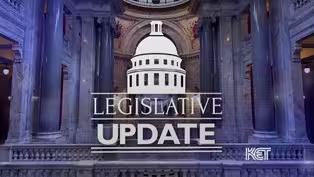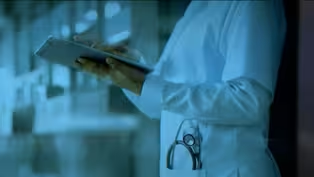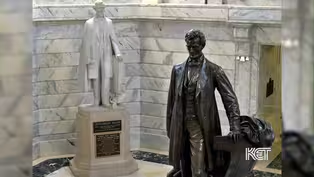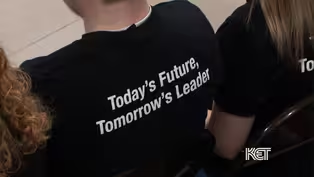
Inside Kentucky Politics (2/16/24)
Clip: Season 2 Episode 186 | 7m 9sVideo has Closed Captions
Inside Kentucky Politics with Bob Babbage and Trey Grayson.
Inside Kentucky Politics with Bob Babbage and Trey Grayson.
Problems playing video? | Closed Captioning Feedback
Problems playing video? | Closed Captioning Feedback
Kentucky Edition is a local public television program presented by KET

Inside Kentucky Politics (2/16/24)
Clip: Season 2 Episode 186 | 7m 9sVideo has Closed Captions
Inside Kentucky Politics with Bob Babbage and Trey Grayson.
Problems playing video? | Closed Captioning Feedback
How to Watch Kentucky Edition
Kentucky Edition is available to stream on pbs.org and the free PBS App, available on iPhone, Apple TV, Android TV, Android smartphones, Amazon Fire TV, Amazon Fire Tablet, Roku, Samsung Smart TV, and Vizio.
Providing Support for PBS.org
Learn Moreabout PBS online sponsorshipTime now for an end of week review of some major political happenings, particularly what's happening in Frankfurt.
We got two of our Fayed's with us, of course, former Kentucky secretaries of State Bob Babbitt and Trey Grayson.
And they have their own things.
Thank you, guys.
People know who you are.
We can dispense with the formalities.
We're coming up.
We have passed the midpoint that happened this week.
When we go back on Tuesday after a three day holiday for the lawmakers, they'll be day 34.
So assess for us, try first.
How do you think the session is going so far and then if it will accelerate after Monday, Tuesday?
So I've been telling people, yeah, we are chronologically halfway through, but we're not substantively halfway through.
You know, a lot of that first month is spent behind the scenes working on bills and in the background.
And we've have only one bill I think has actually been sent to the governor and signed.
So there's a whole lot of activity that's going to happen in March to kind of catch back up.
I would say looking at the as a whole, it hasn't been a particularly surprise to me.
You know, when we when there's preview sessions, when you would have conversations here with folks on Kentucky tonight in the chamber had its chamber day, the things that were identified as the high profile priorities, that's what's been going through.
So it's been to me not a boring session necessarily, but just a predictable session.
How do you size it up trip?
It's a much more elegantly than I got here.
Because he was your intern, correct?
All right.
That was right.
We are halfway through the days and there's a heck of a lot of work that still needs to be done.
Legislators say and press agrees and so the week march is going to be a very busy month.
It's a two year budget year.
And figuring all that out with many suggestions from many quarters and some resources to spend, that hasn't been the case before.
We went through two or three years where we did a one year budget and to get to this point with a surplus being perhaps even more than needed, big questions ahead and many, many worthwhile, meaningful suggestions from all quarters, including the one this week for child care or child development.
$300 million.
Bob raises an interesting point about the increased surplus and some of the decisions that will have to be made.
The House in its budget did not have local projects, which is often what gets funded when there is, you know, when there's a surplus.
So had some water and sewer money, but that's more of a grant pool.
The governor's budget had a lot of those in there, which, you know, he used to his political benefit.
And so the question becomes, at the end, do they spend a little bit more money?
Do they put less on pensions?
Do they bring the rainy day fund down lower because they think it'll be replenished when the fiscal year is done?
Do you do things like the child care assistance of of development or do you do some of these economic development projects?
So that's the budget, probably structural.
They want to they want to structure to lower taxes.
But once you make that decision, you don't have as much left as how they're going to do that.
That's the biggest, I think, remaining question from a budget standpoint that we're going to look for.
Well, of course, the House, they had a separate bill for the for the one time investments.
Right.
That dealt a lot with the broadband and infrastructure and things.
Yeah.
And there's a technical reason for that because what they wanted to do was draw down the surplus money outside of the context of the budget, because those triggers, if you remember, when they passed that are based upon the budget itself.
And so by pulling those projects out of the rainy day fund, it doesn't impact the ability to lower to meet a trigger, which would then allow another half percent come on off the individual income tax rate.
Yeah.
So there were some big bills that passed.
There was a lot of conversation about the bill in the Senate.
This version, Senate Bill six, Mike Woolson, the Whip, his version of the bill.
And we think and he thinks and others think that this is the bill, that if it's going to be a bill is going to be passed on to EEI.
This is the one.
Yeah.
It doesn't go as far as what we saw in other states like Florida, for example.
It was compared to House Bill nine that Representative Decker is introduced.
So this is the one that moved first.
Hospital nine is still out there.
But I think there is going to be a big push to try to if one is going to pass because of certainly folks who are opposed to this particular one.
But I don't want to take it live with this one.
But it would be better to live in a world in which sort of all six pass and House Bill nine I think the universities would tell you that off the record, but maybe not on camera.
Bob, why is this and I think you've asked this question, too, why is this such a big issue this session?
It's become an issue around the country.
It's grown in popularity, particularly with conservatives.
It kind of goes against where we were five or ten years ago.
And many folks were saying do something about diversity and telling corporate America to be more sensitive and more more aggressive to help meet the problem.
It's different now and the mood has changed.
The priority has changed, and the discussion is very strong, very emotional and very significant for our state.
In many ways in terms of our reputation as well as the message home that sends to certain parts of the state where there's support and other parts where there's not.
I remember during the SB 150, which was the sweeping anti-trans measure, HB 470, there were, you know, letters from companies saying, you know, this is not wise and letters from others and who have high positions and are no noteworthy sign.
This is not a wise move in terms of economic development.
Are we hearing that same type of argument from private companies saying you shouldn't go this far?
I don't know that I'm hearing it as loudly, certainly in public as we I think we saw it last year.
Now, again, we're still you know, while we're halfway through it, we're still you know, we've got a couple more weeks for the heavy part of the lift.
So it could be as this gets shaped up, we'll see.
The universities are in a tough spot because it's a budget year.
And so they have their eyes focused on budget that's going to start to set their financial bottom line for a couple of years.
And several universities are asking for other things.
Western Kentucky wants to be able to offer PhDs.
And actually there's a bill that would allow that it would allow any of the comprehensive study that Murray wants, a vet school, EKU wants a osteopathic medical school, and okay, you've got a new president who's, you know, getting around and trying to meet people and get their budget under control.
So there's a lot of moving pieces.
And I think this week we saw President CAPELOUTO speak out on Senate Bill six.
He's really the first president to do that.
You know, he's a different position.
A different position is the flagship school.
He's the dean.
He's been there the longest.
That's what I meant by the dean.
And and so he has probably less to lose because it's new.
And so we'll see if him weighing in might signal to businesses.
Yeah you know we need your support as well or do they continue to say just sort of keep it.
Yeah.
And just watch from the sidelines right now.
And business may do its own saying.
Business is often the head of government and society.
Government's catching up.
Right?
When same sex benefits were being debated, there were already major companies in our state and smaller ones too, giving same sex benefits.
Why?
To retain talent, to draw people to Kentucky, to build their workforce.
That's what this comes down to in the minds of some.
It's all in how you see it.
And if you're lucky, is about accommodating and growing a workforce.
I would say you have a different view than if it's strictly a message type of vote.
Well, I wish we had more time, but we always run out way too quickly.
Thank you both.
Good to see you.
Rest up, you get three days this weekend.
Thank you.
Some wisely.
Take care.
Around the Commonwealth (2/16/24)
Video has Closed Captions
Clip: S2 Ep186 | 1m 59s | Hit the road and enjoy some music, some theater, and some nature. (1m 59s)
Video has Closed Captions
Clip: S2 Ep186 | 3m 24s | Some lawmakers propose lifting state labor protections for 16 and 17-year-olds. (3m 24s)
Video has Closed Captions
Clip: S2 Ep186 | 1m 4s | Eastern Kentucky University could soon be turning out more doctors under a new bill. (1m 4s)
Video has Closed Captions
Clip: S2 Ep186 | 1m 51s | Bill gives lawmakers more control over Capitol Rotunda statue decisions. (1m 51s)
Video has Closed Captions
Clip: S2 Ep186 | 3m 15s | Teens call for tougher enforcement of law that prevents them from buying tobacco products. (3m 15s)
Video has Closed Captions
Clip: S2 Ep186 | 3m 2s | Kim Schatzel on her first year as president of the University of Louisville. (3m 2s)
Providing Support for PBS.org
Learn Moreabout PBS online sponsorship
- News and Public Affairs

Top journalists deliver compelling original analysis of the hour's headlines.

- News and Public Affairs

FRONTLINE is investigative journalism that questions, explains and changes our world.












Support for PBS provided by:
Kentucky Edition is a local public television program presented by KET





